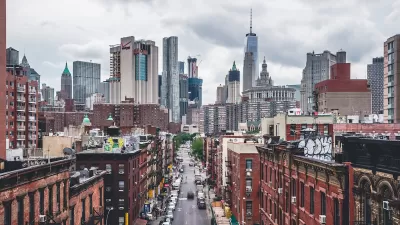Kaid Benfield investigates the rise of a more independent and nimble workforce, and ponders what the new economy means for the shape of cities as we enter an urban epoch
Benfield quotes Thomas Fisher, dean of the College of Design at the University of Minnesota, on the changes to the physical environment that a liberated workforce will demand.
According to Fisher, "The next economy, though, may look more like the way in which people lived and worked prior to the industrial revolution, in which home, office, and shop co-exist in some combination of physical and digital space. This may require rethinking our zoning laws to allow for a much finer-grain mix of uses and repurposing buildings designed for single functions that will have no tenants or buyers if they remain that way."
Benfield argues that, while cities may no longer be necessary to maximize manufacturing efficiencies, they will be essential in providing the amenities to attract and encourage the creativity (paraphrasing Richard Florida) required for the new economy.
FULL STORY: What does the new economy mean for the shape of communities?

Alabama: Trump Terminates Settlements for Black Communities Harmed By Raw Sewage
Trump deemed the landmark civil rights agreement “illegal DEI and environmental justice policy.”

Planetizen Federal Action Tracker
A weekly monitor of how Trump’s orders and actions are impacting planners and planning in America.

The 120 Year Old Tiny Home Villages That Sheltered San Francisco’s Earthquake Refugees
More than a century ago, San Francisco mobilized to house thousands of residents displaced by the 1906 earthquake. Could their strategy offer a model for the present?

Opinion: California’s SB 79 Would Improve Housing Affordability and Transit Access
A proposed bill would legalize transit-oriented development statewide.

Record Temperatures Prompt Push for Environmental Justice Bills
Nevada legislators are proposing laws that would mandate heat mitigation measures to protect residents from the impacts of extreme heat.

Downtown Pittsburgh Set to Gain 1,300 New Housing Units
Pittsburgh’s office buildings, many of which date back to the early 20th century, are prime candidates for conversion to housing.
Urban Design for Planners 1: Software Tools
This six-course series explores essential urban design concepts using open source software and equips planners with the tools they need to participate fully in the urban design process.
Planning for Universal Design
Learn the tools for implementing Universal Design in planning regulations.
Clanton & Associates, Inc.
Jessamine County Fiscal Court
Institute for Housing and Urban Development Studies (IHS)
City of Grandview
Harvard GSD Executive Education
Toledo-Lucas County Plan Commissions
Salt Lake City
NYU Wagner Graduate School of Public Service





























